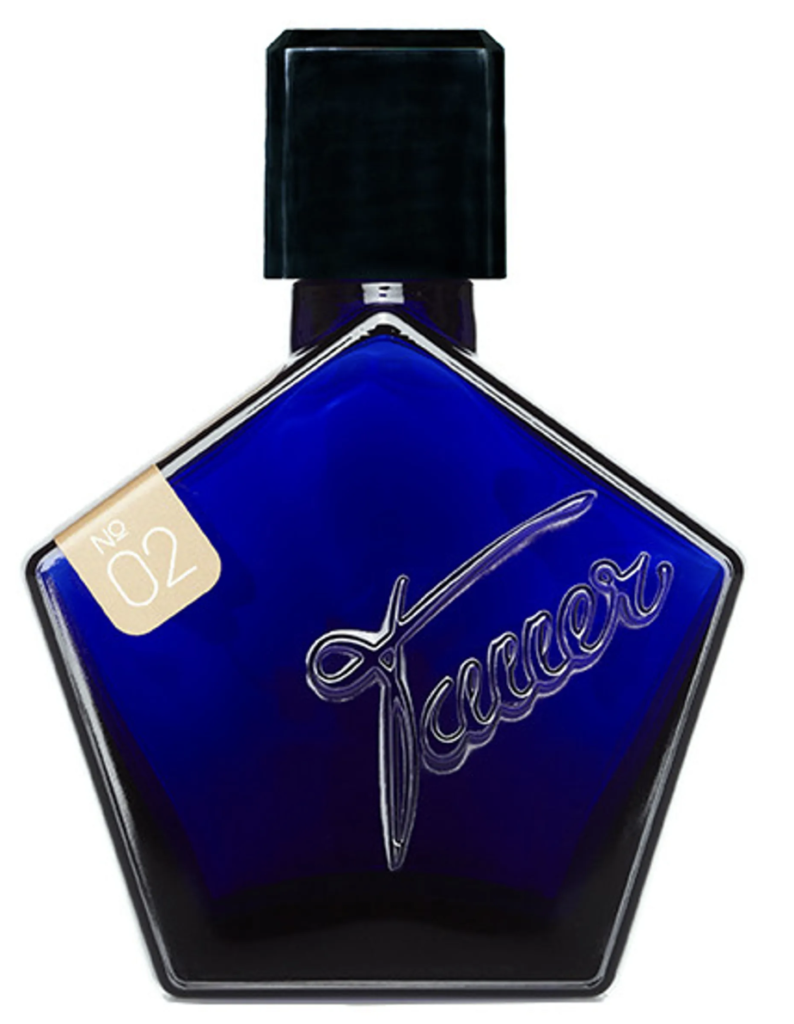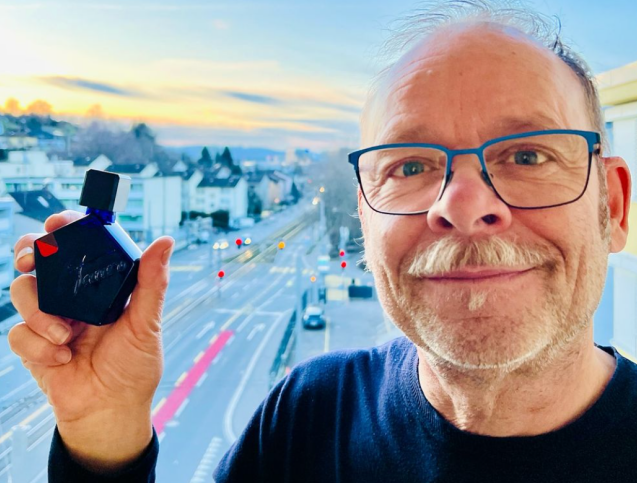It would be unfair to define Andy Tauer solely as a perfumer; he is also an artist. Both through the fragrances he creates and his pioneering role in the niche perfume world, he stands as one of the greatest masters of our time. Handling all aspects of production and sales on his own, he operates like a “one-man army.” As Tauer Perfumes celebrates its 20th anniversary this year, he took the time to answer my questions despite his busy schedule. This interview marks his first-ever conversation with a Turkish audience.
How did you decide to become a fragrance designer?
My journey into fragrance design began as a deeply personal exploration of creativity—a search for a new way to express myself. From the very beginning, I was captivated by the transformative power of scents: the way a single drop of essential oil or a carefully chosen note could evoke memories, stir emotions, or create entirely new sensory experiences. I started with natural aroma materials, drawn to their purity and depth, before venturing into synthetic aroma compounds, which opened an entirely different realm of possibilities.
The creative process of blending these materials became a form of art for me—like painting with invisible colors, where the result was often greater than the sum of its parts.
Mandy Aftel’s Essence and Alchemy profoundly influenced me, deepening my appreciation for the ancient, mystical roots of perfumery. Experimenting with raw materials was not only creatively stimulating but also deeply calming—a meditative practice. The process of mixing and blending felt like a dialogue with the materials, a quiet search for harmony and balance in a chaotic world.
Fragrance design quickly became a journey of discovery—a search for beauty and a quest for perfection. Each blend brought me closer to understanding how scents interact, evolve, and tell a story. It wasn’t just about creating something that smelled good; it was about evoking feelings, capturing an essence, and crafting moments of connection.
Initially, I had no intention of becoming a perfumer or starting a brand. It was simply a passion, akin to a form of prayer. But as I delved deeper, opportunities and connections began to unfold naturally, as though guided by serendipity. Whether through luck, destiny, or a series of fortunate coincidences, I found myself on this path and embraced it wholeheartedly.
Through this journey, I’ve not only honed my craft as a fragrance designer but also grown as a person. Perfume-making has taught me patience, attention to detail, and an appreciation for the beauty in imperfection. It’s a lifelong pursuit where the journey is as rewarding as the result.
How did Switzerland’s watchmaking and craftsmanship traditions and cultural environment influence your designs?
I was born and raised in Switzerland, and its cultural heritage is deeply ingrained in me, often in ways I don’t consciously realize. It’s part of my DNA. Switzerland is renowned for its watchmaking, craftsmanship traditions, typography, sleek design, and strong work ethic. These values shaped my approach to fragrance creation.
As a small country, Switzerland has always had to think globally, and this mindset influenced me as I built my company. From the outset, I focused on the international market rather than limiting myself to Switzerland. Interestingly, some of the world’s largest perfume companies, like IFF and Givaudan, are based in Switzerland, underscoring the country’s legacy of excellence in fragrance and design.
How did you decide to establish Tauer Parfums and what did you experience during this process?
For the first few years, I wasn’t focused on building a company. I was simply enjoying the process of creating perfumes and selling them in limited quantities. Over time, I realized that this passion could become more than just a hobby—it could be the foundation of my life’s work. That realization gave me the courage to pursue it further.
I started by working part-time before eventually dedicating myself fully to perfumery. Building the company has been immensely rewarding but also required significant sacrifices, particularly in terms of time and money. Looking back, those early challenges were invaluable in shaping both me and the brand.
Of course, the world wasn’t waiting for a niche perfume brand created by an unknown perfumer from Switzerland. That was its own challenge. But perseverance, passion, and an authentic approach helped me carve out a place in this highly competitive industry.
How does your process of creating a perfume work from inspiration to the final product? In particular, how did your legendary perfume L’Air du Désert Marocain come about?

L’Air du Désert Marocain has become a defining icon in my collection. I created it 20 years ago and launched it in September 2005, following my first perfume, Le Maroc pour Elle, which was less successful at the time.
The inspiration for L’Air du Désert Marocain came from a friend’s shop, where he sold books and Moroccan goods. Though I hadn’t visited Morocco often, I was captivated by the stories and scents associated with the country.
I envisioned lying on a bed in a Moroccan hotel room in the evening. The doors and windows are open, and the wind carries the desert’s aromas into the room. The moon rises as the air fills with the scents of spices from a nearby souk, citrus, baked goods from a distant bakery, and the smoky fragrance of women cooking over open fires. This vivid sensory image became my inspiration.
Creating the perfume was far from easy. It took countless trials and adjustments to capture the essence of that imagined moment. L’Air du Désert Marocain exemplifies my process: starting with a story or image and transforming it into a scent.
Not all my creations begin this way. Sometimes, a specific raw material inspires me. For instance, the CO2-extracted incense Boswellia serrata inspired Incense Extrême—a crisp, minimalist interpretation of incense. Each fragrance has its own journey, whether sparked by an imagined world or a single raw material, and both approaches are equally rewarding.
e
Certain notes and raw materials continually draw me back. I often work with cistus labdanum extracts and ambre gris in the form of Ambroxan—a versatile molecule that sparkles and shifts with different facets.
Floral extracts like rose oil, rose absolute, and orange blossom are also favorites, though they can be challenging to work with. Sandalwood, whether Indian or Australian, holds a special place in my palette.
Some materials evoke a particular joy for me. For instance, Ambrein—a resinous, woody, amber-like raw material—is utterly captivating. Its natural versatility inspires me endlessly.
However, the true magic lies not in individual ingredients but in the way they come together, creating something greater than the sum of their parts. This transformative alchemy is deeply philosophical and is one of the most rewarding aspects of perfumery.
What do you think about the present and future of niche perfumery and how do you see the industry evolving with technology and cultural influences?
The fragrance industry is cyclical. Big trends emerge, dominate, and eventually fade as consumers seek the next big thing. However, artisanal niche perfumery is unique. Its smaller scale and personal approach allow it to transcend fleeting trends.
Today, the market is overwhelmed with brands, making it difficult for consumers to distinguish between niche, fine fragrance, and mass-market products. Authenticity has become paramount.
Launching a fragrance brand has never been easier. Anyone with resources can start a brand, but many fail because they lack true creativity or compelling stories. Most rely on the same fragrance houses and creators, resulting in products that lack distinction.
Looking ahead, artificial intelligence (AI) will play a larger role in fine fragrance creation and marketing. AI’s ability to analyze vast data sets could drive the creation of fragrances inspired by successful past formulas. While this may appeal to certain market segments, it lacks the intuitive artistry and creativity of human perfumers.
Despite these technological shifts, I believe the world of fragrance remains largely unexplored. There is an immense, untouched “continent” of scents waiting to be discovered—not by machines, but by human creativity and curiosity.
This belief in the limitless potential of human-led exploration fuels my passion. My focus remains on creating something authentic, personal, and original—something that stands apart. I’m proud of this approach and hope to continue my creative journey for many years to come.
What was your most memorable user feedback?
Yes, I remember it vividly. It happened many years ago at an event. A woman with Moroccan roots smelled L’Air du Désert Marocain for the first time during the event. The moment she experienced the fragrance, she started crying. It was as though the scent had unlocked a flood of memories for her—memories so powerful and personal that she was completely overwhelmed.
She later came to me, still emotional, and thanked me for creating something that had such a profound impact on her. That moment was incredibly moving for me as well. To know that my work could evoke such a deep and meaningful response is something I’ll never forget. It was a reminder of the powerful, transformative connection that fragrance can create.
